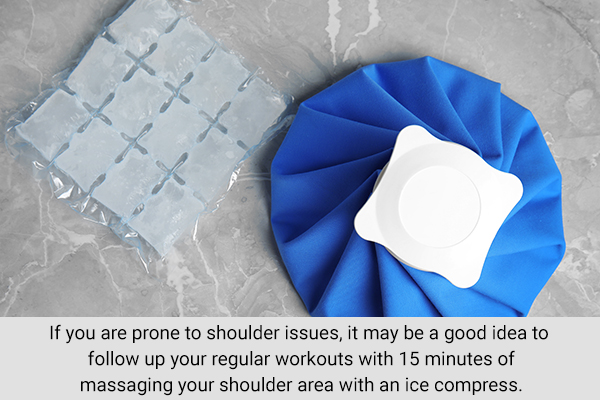In this article:
The shoulder is perhaps the most flexible and the most overworked ball-and-socket joint of the entire human body. It is composed of three bones, namely, the humerus or upper arm bone, the scapula or shoulder blade, and the clavicle or collarbone.

The head of the humerus is shaped like a ball, which fits into a shallow round socket in your shoulder blade called glenoid. This relatively small ball-and-socket joint called the glenohumeral is encapsulated by a covering of muscles called rotator cuff and is secured in its place by strong cords called tendons.
Moreover, a layer of cartilage forms a cushion between the bones to keep them from rubbing together and to absorb any shock impact. Within this cocoon of cartilage, muscles, and tendons, a soft tissue called synovium secretes fluid to keep the joints lubricated and the cartilage healthy.
This intricate framework of muscles and ligaments accords a wide range of motion to your shoulder, making it the most mobile joint in your body. But with this increased mobility comes its fair share of hassles. A glitch in the working of any of the element of this complex shoulder architecture can trigger mild to chronic discomfort and pain.
Prevalence of Shoulder Pain
According to a 2005 study published in the BMJ, self-reported cases of shoulder pain are estimated to be between 16 percent and 26 percent, which goes to show how prevalent this problem actually is. Also, it has been noted that shoulder pain is the third most common cause of musculoskeletal-related visits in primary care. (1)
People of all ages can experience shoulder pain. However, people who use laptops, tablets, and smartphones for extended periods are more prone to this problem than others.
Causes of Shoulder Pain

- Since the shoulder is the most flexible joint, a number of factors and conditions can contribute to shoulder pain.
- The most prevalent cause is an injury to the soft tissues, including the muscles, tendons, and ligaments within the shoulder. This could be due to repetitive use or overuse injury.
- It can even be due to soreness of the tendon in the rotator cuff. (2)
- Sometimes, the pain in your shoulder is actually emanating from injury to some other adjoining area, such as the neck or biceps. This is known as referred pain and does not aggravate with shoulder movement.
Some other causes of shoulder pain can include:
- Arthritis
- Bursitis
- Tendinitis
- Bone spurs
- Tear in the cartilage
- Fractured shoulder bone
- Frozen shoulder due to stiffening of the tendons, ligaments, and muscles
- Spinal cord injury
- Dislocated shoulder
- Certain diseases can also cause shoulder pain, such as diseases of the cervical spine in the neck as well as liver, heart, and gallbladder diseases
Signs and Symptoms of Shoulder Pain
In addition to pain, one may experience symptoms such as:
- Swelling
- Difficulty moving the shoulder
- Tenderness around the joint
Prevention of Shoulder Pain

- If you have previously suffered from any shoulder injury or ailment, it is well advised to regularly perform a few simple range-of-motion exercises to keep your shoulder muscles and tendons properly stretched and flexible to avoid recurrence or a frozen shoulder.
- If you are prone to shoulder issues, it may be a good idea to follow up your regular workouts with 15 minutes of massaging your shoulder area with an ice compress.
- Drink a few glasses of warm lemon water daily to prevent mineral deposits in the joints that can cause pain in your shoulder and other body parts.
When to See a Doctor
If the pain on your shoulder is interfering with your daily activities, then it may be a good idea to see a doctor about it. Additionally, if the pain tends to worsen with even the slightest movement of the shoulder, then a consultation with an orthopedic specialist is warranted.
If the pain and discomfort continue to persist despite proper rest and care or spike to an unbearable degree, professional medical assistance must be sought for proper diagnosis and treatment.
Some worrisome symptoms that call for immediate medical help include:
- An arm that becomes incapacitated to the extent that you are unable to carry even light objects
- A severe injury that causes the joint to appear deformed
- Shoulder pain that is triggered at night or while resting
- Shoulder pain that persists beyond a few days
- Loss of mobility in the arm, including the inability to raise it
- Swelling or noticeable bruising around the joint or arm
- Signs of an infection, including fever, skin redness, and warmth
- Abdominal pain
- Labored breathing
More importantly, sudden shoulder pain without any culpable cause or injury can be a telltale sign of a heart attack. If you experience any such unfounded discomfort, seek emergency medical help.
Expert Answers (Q&A)
Answered by Dr. Mark Miller, MD (Orthopedic Surgeon)
Yes. Certain shoulder problems such as rotator cuff tears and biceps tendinosis, can occur as a result of injury or be insidious and gradually worsen. The patient may not even know that they have a problem until it starts to hurt. We call that a sub-clinical problem until it breaks through that point. Kind of like the straw that broke the camel’s back.
Often an injection with numbing medicine (such as Lidocaine), sometimes combined with a steroid, can give relief. Over-the-counter medications such as Ibuprofen and Naproxen can also help. Sometimes just simple activity modification can be of benefit. In general, I prefer to make the diagnosis prior to embarking on the treatment.
Yes, but that is usually accompanied by chest pain as well and is more acute. An urgent visit to the Emergency Room is appropriate for chest pain.
Different positions work for different people. You will have to figure out which position makes it hurt the least, and settle into your own comfortable spot.
Yes. Night pain is very common for patients with rotator cuff tears. Certain tumors may also cause night pain. Weather-related pain is common in patients with arthritis.
Final Word
Shoulder pain can spring from any of the muscles, ligaments, or tendons in and around your shoulder and can be awfully debilitating. First of all, an impairment in the shoulder greatly hampers your ability to move freely. Second, once your shoulder starts hurting, it can be hard to concentrate on anything else.
Thus, something as common as a shoulder ache is not to be taken lightly as it can significantly impede your ability to carry out daily chores and office work.

- Was this article helpful?
- YES, THANKS!NOT REALLY


